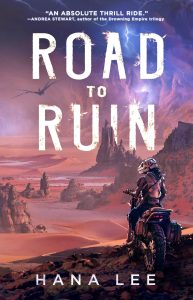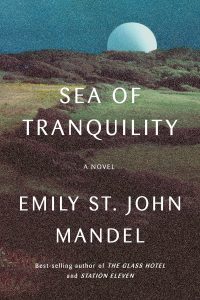Liz Bourke Reviews Road to Ruin by Hana Lee
 Road to Ruin, Hana Lee (Saga 978-1-66803-561-0, $18.99, 368pp, tp.) May 2024.
Road to Ruin, Hana Lee (Saga 978-1-66803-561-0, $18.99, 368pp, tp.) May 2024.
For a debut novel, Hana Lee’s Road to Ruin is a tour de force. Inventive and entertaining, it kept me on the edge of my seat the whole way through.
Jin-Lu makes her living crossing the wasteland. She’s a courier, one of the few who travel outside the safety of the walled cities known as kerinas, delivering goods and letters and dodging dangerous mana storms, outlaw raiders, and aggressive dinosaur-like beasts. These cities are the last remnants of civilisation in the aftermath of a vast, long-ago apocalypse: Only ruins from the time of the Road-Builders remain. In the cities, the Talented use their magical gifts to preserve their communities: Bloomweavers make plants grow, shieldcasters use their power to shield the city against the destructive mana storms, and sparkriders use their talent to power the magebikes that are the best and fastest way to cross the waste. The Talentless, on the other hand, are largely viewed by the Talented ruling class as a drain on limited resources. Most cities afford them few rights; some sterilise them, or even kill them outright. Kerina Sol is the only city where they aren’t seen as intrinsically lesser. But the Talented birthrate has dropped in the last generations, and this crisis-level issue is a rumbling backdrop to the events of the novel.
For the last several years, Jin has been the conduit for covert correspondence between Prince Kadrin of Kerina Sol and Princess Yi-Nereen of Kerina Rut. The correspondence has developed into love letters, and in the course of being the mouthpiece of their affections, Jin herself has fallen in love with both of them. It’s an impossible love: Not only is Jin a low-class courier, one who fled Kerina Tez with her Talentless mother and came to Kerina Sol for refuge, but the two of them already have each other.
In Kerina Rut, women, even Talented ones, are second-class citizens, valued primarily for their ability to breed more Talented children. Yi-Nereen is a powerful shieldcaster, but her marriage has been arranged without her consent. Rather than be a broodmare – one who risks being involuntarily sterilised if she produces more than two Talentless children – she asks for Jin’s help to escape to Kerina Sol. Jin’s feelings for Yi-Nereen means she can’t help but agree, even though if they’re caught, Yi-Nereen might be killed and Jin definitely will.
But their flight across the wasteland doesn’t go smoothly. Forced to detour because of a storm, they’re given shelter by a tiny, insular community surviving out in the wastes who speak a language neither of them can understand, and who might be descendants of the long-gone Road-Builders. Yi-Nereen is fascinated. Jin is suspicious. But the storm isn’t long over before they discover that they’ve been pursued: Yi-Nereen’s fiancé, Sou-Zell, has hired a bounty hunter, one of the raiders that haunt the wastes, to chase them down. This raider is a figure from Jin’s past, a woman with a whole heap of grudges. Once upon a time, she was Jin’s first love. Now she means to use Yi-Nereen to bring down the kerinas.
When Yi-Nereen is captured, Jin’s only hope to save her is that she can reach Kadrin and he can bring the resources of Kerina Sol to bear for a rescue. But when the ruling council of Kerina Sol declines to assist, it’s up to Jin, Kadrin, and an unexpected ally in the form of Sou-Zell – much disturbed by Yi-Nereen’s father’s reaction to her flight – to follow Yi-Nereen’s abductors’ trail into the heart of the wasteland, to secrets of the Road-Builders, of inheritance, of magic, and of the wasteland itself, with the storm of the century promising to wreak destruction on all their heads. The climax is by turns thrilling and nerve-wracking, while the conclusion leaves matters of the heart complicated and unsettled, but nonetheless with the possibility open for everyone’s future romantic happiness.
When I heard Road to Ruin’s premise, my reaction was this will be either great or terrible. From the very first page, when a juvenile flying lizard swooped out of the sky to knock Jin off her bike, I knew I was going to come down on the great side. Lee’s debut gives me the impression that Mad Max: Fury Road is a formative part of its DNA, but it recollects, too, something of our ongoing climate disaster moment. The landscape of the wastes is deeply atmospheric, and Lee’s fantastical postapocalyptic worldbuilding feels fresh and vivid. The language is taut and evocative, and the action barrels forward at a nail-biting clip, mounting in tension and intensity right through to the conclusion.
Jin is an appealing character, a scruffy vagabond with a heart of gold and a complicated past, most at home on her magebike in the wilderness, prickly but prone to unexpected gestures of heroism or compassion. Yi-Nereen and Kadrin emerge more gradually. Lee puts one of their letters at the end of every chapter, so that we see their relationship (and Jin’s parenthetical emergence into it) develop, as well as Yi-Nereen’s investigation into why the Talented birthrate has fallen. Yi-Nereen is a complex, compelling woman, trapped by the patriarchal strictures of Kerina Rut into a state of fury and despair. She’s been manipulating both Jin and Kadrin in order to give herself options for escape that don’t involve dying, and has found herself developing real feelings for them both despite herself. Kadrin initially comes across as a more whimsical, less effectual sort of person, whose Talentless status relegates him to a decorative role within his influential family, and who worries that his feelings for Jin are a kind of transference of his feelings for Yi-Nereen. But it becomes clear that he has a core of steel.
Lee has a deft hand with characterisation. Even Jin’s bounty-hunter ex-lover and Sou-Zell come across as whole, complicated people: They may be assholes, but they’re not without their sympathetic points.
If I have one complaint, it’s that I wanted more. Road to Ruin is an impressive debut: It’s an incredibly fun book, and a really satisfying one. I want to read a sequel as soon as possible, and I’m looking forward to seeing where Lee’s career goes in future.
Liz Bourke is a cranky queer person who reads books. She holds a Ph.D in Classics from Trinity College, Dublin. Her first book, Sleeping With Monsters, a collection of reviews and criticism, is out now from Aqueduct Press. Find her at her blog, her Patreon, or Twitter. She supports the work of the Irish Refugee Council and the Abortion Rights Campaign.
This review and more like it in the May 2024 issue of Locus.
 While you are here, please take a moment to support Locus with a one-time or recurring donation. We rely on reader donations to keep the magazine and site going, and would like to keep the site paywall free, but WE NEED YOUR FINANCIAL SUPPORT to continue quality coverage of the science fiction and fantasy field.
While you are here, please take a moment to support Locus with a one-time or recurring donation. We rely on reader donations to keep the magazine and site going, and would like to keep the site paywall free, but WE NEED YOUR FINANCIAL SUPPORT to continue quality coverage of the science fiction and fantasy field.
©Locus Magazine. Copyrighted material may not be republished without permission of LSFF.







